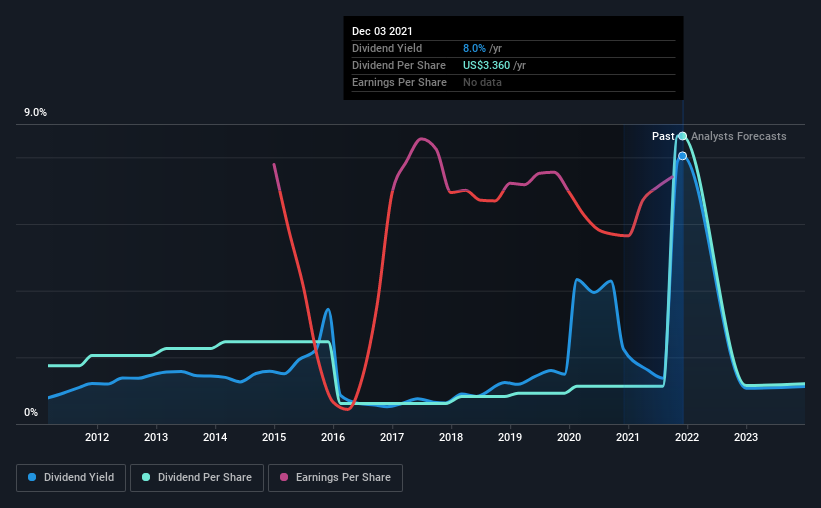Read This Before Considering Devon Energy Corporation (NYSE:DVN) For Its Upcoming US$0.84 Dividend
Some investors rely on dividends for growing their wealth, and if you're one of those dividend sleuths, you might be intrigued to know that Devon Energy Corporation (NYSE:DVN) is about to go ex-dividend in just four days. The ex-dividend date occurs one day before the record date which is the day on which shareholders need to be on the company's books in order to receive a dividend. It is important to be aware of the ex-dividend date because any trade on the stock needs to have been settled on or before the record date. In other words, investors can purchase Devon Energy's shares before the 9th of December in order to be eligible for the dividend, which will be paid on the 30th of December.
The company's next dividend payment will be US$0.84 per share, and in the last 12 months, the company paid a total of US$3.36 per share. Last year's total dividend payments show that Devon Energy has a trailing yield of 8.0% on the current share price of $41.77. We love seeing companies pay a dividend, but it's also important to be sure that laying the golden eggs isn't going to kill our golden goose! As a result, readers should always check whether Devon Energy has been able to grow its dividends, or if the dividend might be cut.
Check out our latest analysis for Devon Energy
Dividends are typically paid from company earnings. If a company pays more in dividends than it earned in profit, then the dividend could be unsustainable. Devon Energy has a low and conservative payout ratio of just 21% of its income after tax. Yet cash flows are even more important than profits for assessing a dividend, so we need to see if the company generated enough cash to pay its distribution. The good news is it paid out just 14% of its free cash flow in the last year.
It's positive to see that Devon Energy's dividend is covered by both profits and cash flow, since this is generally a sign that the dividend is sustainable, and a lower payout ratio usually suggests a greater margin of safety before the dividend gets cut.
Click here to see the company's payout ratio, plus analyst estimates of its future dividends.
Have Earnings And Dividends Been Growing?
Businesses with shrinking earnings are tricky from a dividend perspective. If earnings fall far enough, the company could be forced to cut its dividend. With that in mind, we're discomforted by Devon Energy's 8.3% per annum decline in earnings in the past five years. When earnings per share fall, the maximum amount of dividends that can be paid also falls.
Another key way to measure a company's dividend prospects is by measuring its historical rate of dividend growth. Devon Energy has delivered 17% dividend growth per year on average over the past 10 years.
To Sum It Up
Is Devon Energy an attractive dividend stock, or better left on the shelf? Devon Energy has comfortably low cash and profit payout ratios, which may mean the dividend is sustainable even in the face of a sharp decline in earnings per share. Still, we consider declining earnings to be a warning sign. Overall we're not hugely bearish on the stock, but there are likely better dividend investments out there.
With that in mind, a critical part of thorough stock research is being aware of any risks that stock currently faces. To help with this, we've discovered 6 warning signs for Devon Energy (1 is a bit unpleasant!) that you ought to be aware of before buying the shares.
A common investment mistake is buying the first interesting stock you see. Here you can find a list of promising dividend stocks with a greater than 2% yield and an upcoming dividend.
Have feedback on this article? Concerned about the content? Get in touch with us directly. Alternatively, email editorial-team (at) simplywallst.com.
This article by Simply Wall St is general in nature. We provide commentary based on historical data and analyst forecasts only using an unbiased methodology and our articles are not intended to be financial advice. It does not constitute a recommendation to buy or sell any stock, and does not take account of your objectives, or your financial situation. We aim to bring you long-term focused analysis driven by fundamental data. Note that our analysis may not factor in the latest price-sensitive company announcements or qualitative material. Simply Wall St has no position in any stocks mentioned.

